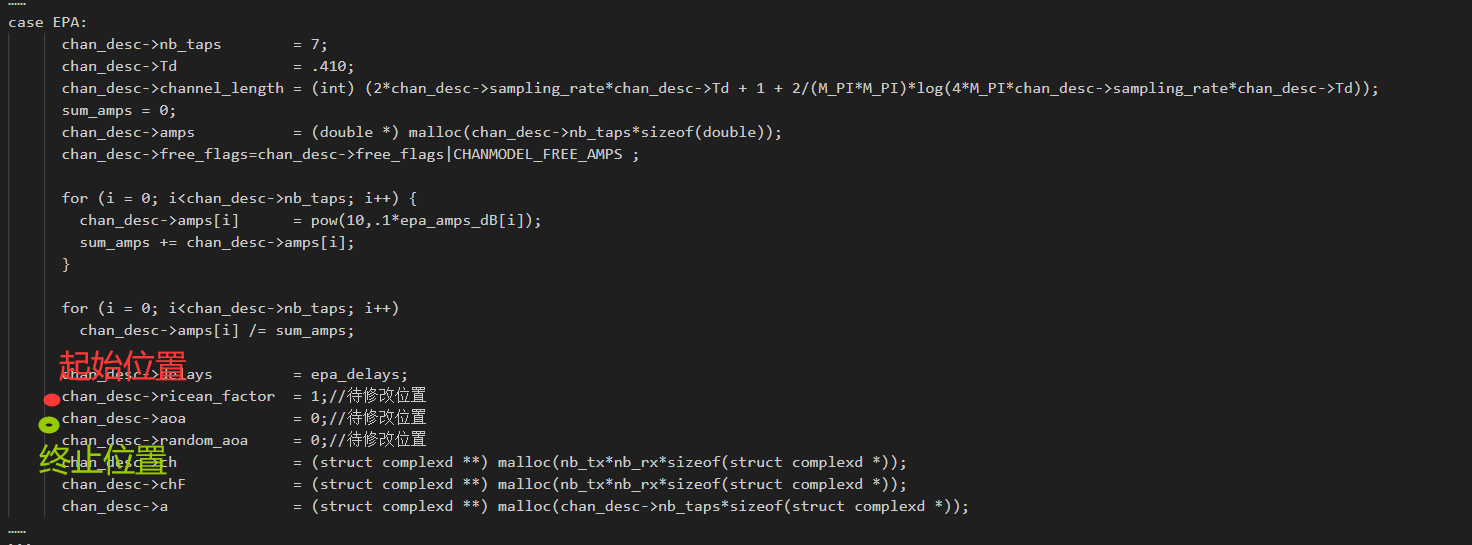# 【python技巧】替換文件中的某幾行 ## 1. 背景描述 最近在寫一個後端項目,主要的操作就是根據用戶的前端數據,在後端打開項目中的代碼文件,修改對應位置的參數,因為在目前的後端項目中經常使用這個操作,所以簡單總結一下。 ``` 1. 文件路徑:./test.c 2. 文件內容 …… cas ...
【python技巧】替換文件中的某幾行
1. 背景描述
最近在寫一個後端項目,主要的操作就是根據用戶的前端數據,在後端打開項目中的代碼文件,修改對應位置的參數,因為在目前的後端項目中經常使用這個操作,所以簡單總結一下。
1. 文件路徑:./test.c
2. 文件內容
……
case EPA:
chan_desc->nb_taps = 7;
chan_desc->Td = .410;
chan_desc->channel_length = (int) (2*chan_desc->sampling_rate*chan_desc->Td + 1 + 2/(M_PI*M_PI)*log(4*M_PI*chan_desc->sampling_rate*chan_desc->Td));
sum_amps = 0;
chan_desc->amps = (double *) malloc(chan_desc->nb_taps*sizeof(double));
chan_desc->free_flags=chan_desc->free_flags|CHANMODEL_FREE_AMPS ;
for (i = 0; i<chan_desc->nb_taps; i++) {
chan_desc->amps[i] = pow(10,.1*epa_amps_dB[i]);
sum_amps += chan_desc->amps[i];
}
for (i = 0; i<chan_desc->nb_taps; i++)
chan_desc->amps[i] /= sum_amps;
chan_desc->delays = epa_delays;
chan_desc->ricean_factor = 1;//待修改位置
chan_desc->aoa = 0;//待修改位置
chan_desc->random_aoa = 0;//待修改位置
chan_desc->ch = (struct complexd **) malloc(nb_tx*nb_rx*sizeof(struct complexd *));
chan_desc->chF = (struct complexd **) malloc(nb_tx*nb_rx*sizeof(struct complexd *));
chan_desc->a = (struct complexd **) malloc(chan_desc->nb_taps*sizeof(struct complexd *));
……
2. 單行修改-操作步驟
- 讀取文件
使用python中的open()函數進行文件讀取,將數據存儲在緩衝區。
#1. 讀取文件
path='./test.c'
with open(path, 'r') as file:
file_content = file.read()
- 查找文件替換位置
以查找chan_desc->ricean_factor = 1;//待修改位置為例,查找這句話的起點和終點。
## 註:此步驟需要import re
#2. 查找文件替換位置
start_index=file_content.find('chan_desc->ricean_factor = ')#起點
end_index=file_content.find('chan_desc->aoa = ',start_index)#終點
if end_index==-1 or start_index==-1:
print('未找到待修改位置')
#此時得到的兩個指針,分別指向了待修改位置的起點和終點,如下圖所示:

- 設置替換文件內容
假設目前只修改這一行的參數,
#3. 設置替換文件內容
ricean_factor=3#假設這是要修改的參數信息
updata_content=file_content[:start_index]#獲取這行代碼之前的內容
update_content+='chan_desc->ricean_factor = '+str(ricean_factor)+';//待修改位置'#修改這行代碼
update_content+=file_content[end_index:]#獲取這行代碼之後的內容
#此時得到的update_content就是修改後的完整文件內容,只修改了ricean_factor這一行的值
- 寫入文件
同樣使用python中的open函數。
#4. 寫入文件
if update_content!="":#如果修改內容不為空
with open(path, 'w') as file:#w表示覆蓋寫入,之前的內容都會被覆蓋
file.write(update_content)
- 總代碼
整體的代碼如下所示:
import re
#1. 讀取文件
path='./test.c'
with open(path, 'r') as file:
file_content = file.read()
#2. 查找文件替換位置
start_index=file_content.find('chan_desc->ricean_factor = ')#起點
end_index=file_content.find('chan_desc->aoa = ',start_index)#終點
if end_index==-1 or start_index==-1:
print('未找到待修改位置')
#3. 設置替換文件內容
ricean_factor=3#假設這是要修改的參數信息
updata_content=file_content[:start_index]#獲取這行代碼之前的內容
update_content+='chan_desc->ricean_factor = '+str(ricean_factor)+';//待修改位置'#修改這行代碼
update_content+=file_content[end_index:]#獲取這行代碼之後的內容
#4. 寫入文件
if update_content!="":#如果修改內容不為空
with open(path, 'w') as file:#w表示覆蓋寫入,之前的內容都會被覆蓋
file.write(update_content)
3. 多行修改-操作步驟
- 多行修改思路
多行修改有兩種修改思路,如果修改部分比較集中,則可直接替換一整塊的字元串內容,如果修改部分較為分散,則需要單獨查找修改位置,然後再分別進行替換。 - 多行修改-整塊替換
try:
with open(file_path, "r") as file:
file_content = file.read()
except Exception as e:
return str(e)
# 設置改寫內容
updated_content = ""
# 查找修改
start_index_1 = file_content.find("start_sentence")#要確保查找元素的唯一性
end_index_1 = file_content.find("end_sentence",start_index_1,)
if start_index_1 == -1 or end_index_1 == -1:
print("未找到待修改位置")
return -1
#
updated_content = file_content[:start_index_1]#獲取這行代碼之前的內容
updated_content += "start_sentence和end_sentence之間的sentence_1;\n"
updated_content += "start_sentence和end_sentence之間的sentence_2;\n"
updated_content +=file_content[end_index_1:]
##此時updated_content就是修改後的完整文件內容
if updated_content != "":
with open(file_path, "w") as file:
file.write(updated_content)
else:
print("修改失敗")
return -1
- 多行修改-局部替換
try:
with open(file_path, "r") as file:
file_content = file.read()
except Exception as e:
return str(e)
# 設置改寫內容
updated_content = ""
# 查找修改
start_index_1 = file_content.find("start_sentence_1")#要確保查找元素的唯一性
end_index_1 = file_content.find("end_sentence_1",start_index_1,)
start_index_2 = file_content.find("start_sentence_2",end_index_1)
end_index_2 = file_content.find("end_sentence_2",start_index_2,)
start_index_3 = file_content.find("start_sentence_3",end_index_2)
end_index_3 = file_content.find("end_sentence_3",start_index_3,)
start_index_4 = file_content.find("start_sentence_4",end_index_3)
end_index_4 = file_content.find("end_sentence_4",start_index_4,)
if (
start_index_1 == -1
or end_index_1 == -1
or start_index_2 == -1
or end_index_2 == -1
or start_index_3 == -1
or end_index_3 == -1
or start_index_4 == -1
or end_index_4 == -1
):
print("未找到待修改位置")
return -1
#
updated_content = file_content[:start_index_1]#獲取這行代碼之前的內容
updated_content += "start_sentence_1和end_sentence_1之間的內容"
updated_content +=file_content[end_index_1:start_index_2]
updated_content += "start_sentence_2和end_sentence_2之間的內容"
updated_content +=file_content[end_index_2:start_index_3]
updated_content += "start_sentence_3和end_sentence_3之間的內容"
updated_content +=file_content[end_index_3:start_index_4]
updated_content += "start_sentence_4和end_sentence_4之間的內容"
updated_content += file_content[end_index_4:]
##此時updated_content就是修改後的完整文件內容
if updated_content != "":
with open(file_path, "w") as file:
file.write(updated_content)
else:
print("修改失敗")
return -1



